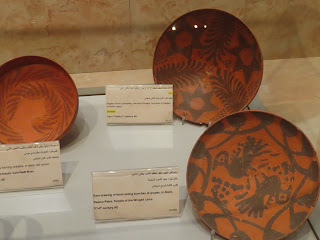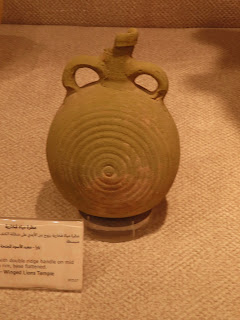The Petra museum is relatively new and was one of the best we had visited in a long time. They had only the "best of the best" items on display. For instance the bronze piece above is of Artemis the goddess of the hunt. It was a rare bronze piece imported from Athens to Perta in the 2nd century CE. It was found in a side wadi possibly swept there by a flood. Bronze was a very expensive material back in those days and it speaks to the wealth and power of Petra at that time. This museum was very informative and we really took our time exploring all the displays. We saw Doug who we met at dinner the night before. They had visited Petra earlier that morning and Sandy was so wiped out that she went back to the hotel. He was certainly a hoot. In the course of the conversation he told us that he rides dressage and four post carriages (carriages with four wheels). In addition his grandfather was a member of the regional parliament and to make a statement he drove his four post carriage right up the exterior steps of the building and parked it there, blocking all entry and exit, while he went in and protested some legislation that he disagreed with
More examples of the water management systems
Dhu-Shara was the top god in these parts but was not immune to the "Got your nose game" This bust came from the Temenos Gate
A great way to organize the information. From right to left the time line runs from 1.5 million BCE to 168 BCE. The data packed hangings continues out of the frame
This is an example of the topics that were covered
A stone altar from the 8th century BCE
The Nabataeans added these elephant heads to the columns to make their own architectural style
Here ia an elephant in place
The hair do is impressive with spirals
The top of the column with floral motifs
Medusa is not happy
A flying sphynx
This huge frieze had oak leave, pomegranates, poppies, grapes, pinecones, wheat and grasshoppers
A few of the fruits and grains
Grasshopper!
The Goddess of Hayyan originally had precious stones in the place of the eyes
An eye idol has eyes like the stars
Nicer working materials like alabaster was used as time went on and wealth accumulated
Another imported statue, this time from Greece or Turkey in the 2nd century CE. It is pour buddy Hercules
Hermes has little wings in his hair
Another great way to impart a large amount of information quickly and in an entertaining way
It was created in partnership with Japan
An illustration showing hoe the tombs were created. We can see the worker climbing up the squares cut outs on the left side
Mosaics were discovered and removed to the museum
The fine pottery that they were famous for
This reminds me of Lisbon's sidewalk designs
Showing the progression of the tomb styles
A washbasin is most delicate
Many of the external decorations of the tombs did not survive the earthquakes and were collected from the rubble
Nabataean Script was a distinct alphabet
More external decorative items
This is a Phrygian stone vase imported from Rome. It was 4 feet tall and is one of the best examples of this style of vase
The hair still has traces of the yellow and red pigments. All the statues were painted with pigments. Aphrodite would have had a crown or some sort of headdress attached to the current bald spot. She was found in a rubble pile of cleared material, dumped there after the 363 earthquake
A Pilgram Vase
Incense burner
Gold! Women had a high status in the Nabataean society. They could own property, inherit wealth, run their own business, found on coins and even be Queen. Very progressive for the times!
Play that funky music!
We saw one of these huge dresses in Amman. I thought it was just made large for display purposes but this is the actual size. The "madraqu" is attached at the waist and repeatedly gathered dup from the bottom and attached again at the waist. This way extra pockets in the material could be created and used to store precious items and to carry goods as well,






































